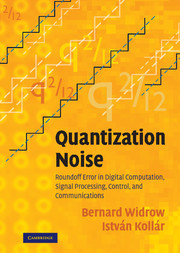 Quantization Noise
Quantization Noise Book contents
- Frontmatter
- Contents
- Preface
- Acknowledgments
- Glossary of Symbols
- Acronyms and Abbreviations
- Part I Background
- Part II Uniform Quantization
- Part III Floating–Point Quantization
- Part IV Quantization in Signal Processing, Feedback Control, and Computations
- Part V Applications of Quantization Noise Theory
- Part VI Quantization of System Parameters
- APPENDICES
- Bibliography
- Index
Preface
Published online by Cambridge University Press: 06 July 2010
- Frontmatter
- Contents
- Preface
- Acknowledgments
- Glossary of Symbols
- Acronyms and Abbreviations
- Part I Background
- Part II Uniform Quantization
- Part III Floating–Point Quantization
- Part IV Quantization in Signal Processing, Feedback Control, and Computations
- Part V Applications of Quantization Noise Theory
- Part VI Quantization of System Parameters
- APPENDICES
- Bibliography
- Index
Summary
For many years, rumors have been circulating in the realm of digital signal processing about quantization noise:
(a) the noise is additive and white and uncorrelated with the signal being quantized, and
(b) the noise is uniformly distributed between plus and minus half a quanta, giving it zero mean and a mean square of one–twelfth the square of a quanta.
Many successful systems incorporating uniform quantization have been built and placed into service worldwide whose designs are based on these rumors, thereby reinforcing their veracity. Yet simple reasoning leads one to conclude that:
(a) quantization noise is deterministically related to the signal being quantized and is certainly not independent of it,
(b) the probability density of the noise certainly depends on the probability density of the signal being quantized, and
(c) if the signal being quantized is correlated over time, the noise will certainly have some correlation over time.
In spite of the “simple reasoning,” the rumors are true under most circumstances, or at least true to a very good approximation. When the rumors are true, wonderful things happen:
(a) digital signal processing systems are easy to design, and
(b) systems with quantization that are truly nonlinear behave like linear systems.
In order for the rumors to be true, it is necessary that the signal being quantized obeys a quantizing condition. There actually are several quantizing conditions, all pertaining to the probability density function (PDF) and the characteristic function (CF) of the signal being quantized.
Information
- Type
- Chapter
- Information
- Quantization NoiseRoundoff Error in Digital Computation, Signal Processing, Control, and Communications, pp. xix - xxPublisher: Cambridge University PressPrint publication year: 2008